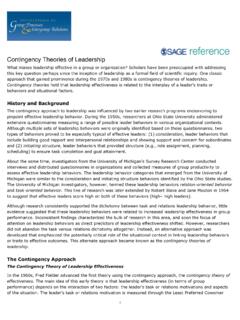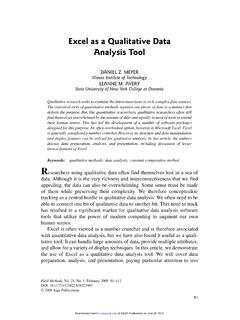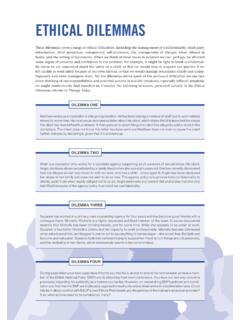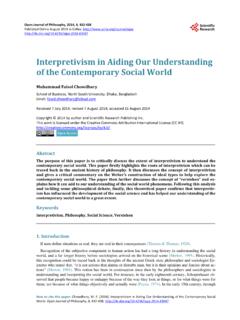Transcription of ETHNOGRAPHIC RESEARCH - SAGE Publications Inc
1 ETHNOGRAPHIC RESEARCHThis chapter will provide information on: What is specific about ETHNOGRAPHIC RESEARCH How the ETHNOGRAPHIC RESEARCH process proceeds What are the methodological and ethical principles of ETHNOGRAPHIC RESEARCH How to do ETHNOGRAPHIC fieldwork How to analyze and interpret ETHNOGRAPHIC RESEARCH materials How to write and evaluate ETHNOGRAPHIC IS ETHNOGRAPHIC RESEARCH ? ETHNOGRAPHIC RESEARCH takes a cultural lens to the study of people s lives within their communities (Hammersley and Atkinson, 2007; Fetterman, 2010).
2 The roots of ethno graphy lie in anthropological studies that focused on studying social and cultural aspects of small communities in foreign countries. The researchers lived among the inhabitants with the purpose of understanding the culture that these people shared. Thus, the classic anthropologists were foreigners in their field sites. It often took years for them to get into the culture of the community that they were studying. In order to do so, they had to learn the language necessary for socializing with the inhabitants and understanding their daily habits, rituals, norms and the 1930s, the critical sociologists of the Chicago school introduced a new stream of ETHNOGRAPHIC studies when they started to explore their own street cor ners just as if they were unknown places (Deegan, 2007).
3 Currently, the fieldsites of 1212_Eriksson_Kovalainen_Ch 14920-Oct-15 4:32:21 PM QUALITATIVE METHODS IN BUSINESS RESEARCH150ethnographic RESEARCH can be anywhere, including familiar settings. ETHNOGRAPHIC RESEARCH can take place in many types of communities including formal and infor mal organizations such as workplaces, urban communities, fan clubs, trade fares, shopping centres, and social media. In addition, the RESEARCH is often performed in the native language of the researcher.
4 The main aim of the ethnographers, however, remains about the same: to observe and analyze how people interact with each other and with their environment in order to understand their culture (see Box ).The emic and etic perspectivesEthnographers seek to gain an emic perspective, or the native s point of view of a specific culture (Hammersley and Atkinson, 2007). This means that they try to look at the culture under study from the inside; through the meanings that the members of that culture live with.
5 Therefore, ethnographers avoid imposing conceptual and theoretical frameworks on empirical data at the beginning of the RESEARCH process. According to our experience, understanding the emic perspective is difficult for a novice business researcher who is more familiar with what is called the etic perspective. Etic perspective means that the researcher looks at the culture mostly with theoretical conceptions. Although researchers tend to combine emic and etic perspectives at some point of their RESEARCH , you can still emphasize them in different ways throughout your study.
6 For an example of this, see the Laukkanen and Eriksson (2013) article in which they discuss various ways of combining emic and etic perspectives when studying managerial ethnographers are interested in the emic perspective, that is, how members of a culture give meaning to the world, they are also interested in language practices. This is also true in business related ETHNOGRAPHIC studies; for good examples, see K rreman and Alvesson (2001) and Samra Fredericks (2003). In ETHNOGRAPHIC RESEARCH , language is conceptualized as a social practice: what people say and what they keep silent about produce meaning and value in social life.
7 Language practices are socially constituted because they are shaped by social and historical forces, which are beyond the control of individuals. At the same time, however, language practices constitute people s lives together by specifying, creating, maintaining and changing the frames of their elements of ETHNOGRAPHIC researchEthnographic RESEARCH entails: an interest in cultures, cultural understanding, and meaning-making; looking at the culture from the inside , with the emic perspective;12_Eriksson_Kovalainen_Ch 15020-Oct-15 4:32:21 PMETHNOGRAPHIC RESEARCH 151 being attentive to language practices.
8 Being close to the field and collecting first-hand versions of ETHNOGRAPHIC researchEthnography exists in many forms and ethnographers continuously debate about what counts as ethnography, and how to represent the field (van Maanen, 2011). As a result, there are distinct versions of ETHNOGRAPHIC RESEARCH that have their own epis temological backgrounds and varied RESEARCH practices (Atkinson et al., 2007). This is why, if you plan to do an ETHNOGRAPHIC study, you will need to specify what kind of ETHNOGRAPHIC RESEARCH you wish to perform.
9 Besides the basic approach outlined in this chapter, there are also more specific ethnographies (Castagno, 2012) and feminist ethnographies (Pillow and Mayo, 2011) are examples of theoretically informed approaches relying on the principles of critical theory (see Chapter 18) and feminist theory (see Chapter 19). Autoethnography (Adams, Jones and Ellis, 2014) refers to an approach where the researcher s personal and reflective perspective is part of the analysis. The expansion of the Internet and social media has boosted researchers to perform virtual ethnography or netnography (see Hine, 2010).
10 Virtual ethnog raphy rests on the argument that the ethnographer should experience the social life of the RESEARCH subjects regardless of how those experiences are mediated. Related to this, ethnography can be global, multi sited and mobile in the sense that researchers follow people around physical and virtual places (Epstein, Fahey and Kenway, 2013). Business-related ETHNOGRAPHIC researchWorkplace, industrial and organizational ethnographies (Eberle and Maeder, 2011; Yanow, Ybema and van Hulst, 2012) provide in depth descriptions on a wide range of topics within the field of management and organizations, such as managerial action, organizational cultures, interaction of professional groups, work behaviour and co worker relations, emotional labour, and sexual harassment.














